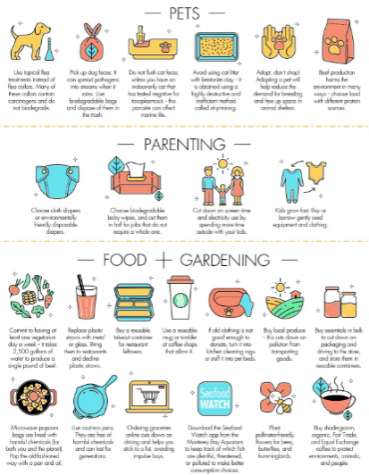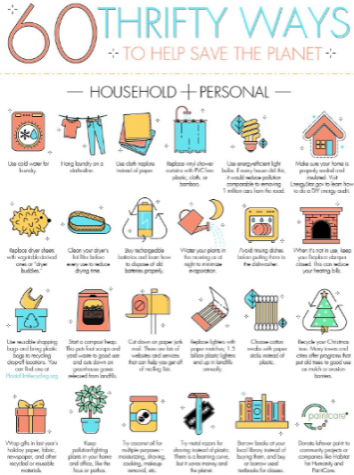Ten Simple, Everyday Actions You Can Do to Help the Environment
April 24, 2019
This Earth day, the main focus of the public is to preserve and help our environment.
For the past few decades, more trash has ended up in our ecosystems, more pollution is in our air, and more warming of the earth has occurred than ever before.
While it might not seem helpful, the average person can make small changes in their everyday life to help the environment in a big way.
Here are some of the simplest, yet most impactful, ways you can change your life for the better.

There are several ways to help the planet, from food to pets to family.
Recycle
No matter how much it is said, there are still people in the world who do not recycle. The unrecycled plastic, paper and cardboard ends up spilling into our waterways and landfills, causing harm to the ecosystem and animals. Check with the trash company in your neighborhood to see what you can recycle and how to get started.
Bike, Walk, or Carpool
For each car on the road, there is a trail of exhaust that goes into the air. All that exhaust builds up, creating ODS, or ozone-depleting substances, that cause almost irreversible air pollution. By carpooling with other students/coworkers, the amount of pollution cuts down from three or four cars to just one. You can also bike around or walk, causing no air pollution and giving you a workout in the process.
Get Reusable Items
If you don’t have one already, get a reusable water bottle! There are plenty of other items you can get that are reusable, such as straws, shopping bags, coffee cups and more. By having reusable items, not only are you helping the environment, but you can also spark a conversation off of the reusable items. “Is that a reusable coffee cup?” can result in a conversation about helping the environment and even the other person buying their own reusable items.
Don’t Buy Boxed Food
More and more grocery stores are becoming more eco-friendly with bulk options of food, such as beans, fruits, vegetables and even cereal. Simply grab some glass jars and head out to your local grocery store with bulk options to fill up. It is priced by weight, meaning you might be able to get more bang for your buck. Sonnewald Natural Foods in Spring Grove has an entire room dedicated to bulk foods.
Don’t Litter
Just like recycling, too many people litter when they are told constantly not to. Even if it is simply a piece of gum, that gum could be mistaken as food by a bird and get into their system, harming their body.
Cut Down on Energy
There are several ways that you can cut down on energy use around your house, helping the environment and saving you money at the same time. Try and live in the climate, and accept the heat/cold until it becomes necessary to turn on AC/Heating. Make sure to turn off lighting when you’re not in the room. Wash your clothes with cold water, and hang them up to dry instead of using a dryer. It is as easy as the snap of a finger to save energy, making you and the environment around you happier.
Eat Less Meat
Many who eat meat carry around a large carbon footprint with them. By reducing the amount of meat you eat, even to where it is simply two to three times a week, your carbon footprint will reduce significantly. Not only will your carbon footprint decrease, but your body will begin to feel and look better, as you are no longer often eating red meat. You don’t have to cut all protein – chicken,tofu, and seafood are all healthier and better options to eat than red meat.
Grow Your Own Food
Perhaps the most beneficial to you, starting a garden in your backyard has several benefits. Not only are you growing healthy food for yourself, but you are saving money. You are saving money from buying the produce at the store, and saving gas that it would take to get to the store in the first place. Plants, such as vegetables, also help the oxygen around you become more clean.
Start Composting
Although composting is very popular, not many people actually know what composting is. Composting includes different items of waste put into a container, ultimately creating a conditioned soil that helps your garden/yard become more rich in nutrients. Put organic food scraps into your composting, let insects in to break the compost down, and you have soil that helps your plants thrive! Composting helps the environment by reducing the amount of greenhouse gases put into the air by landfills. For more information on how to compost, visit Eartheasy.
Learn About your Ecological Footprint
The first step to helping your environment is learning about how you are damaging it. By taking online tests such as the Ecological Footprint Calculator, you can learn about how much you are damaging the environment and learn from the result to treat the environment around you better.

In honor of Earth day, photos describing how you can help the planet have been spreading all over social media.
